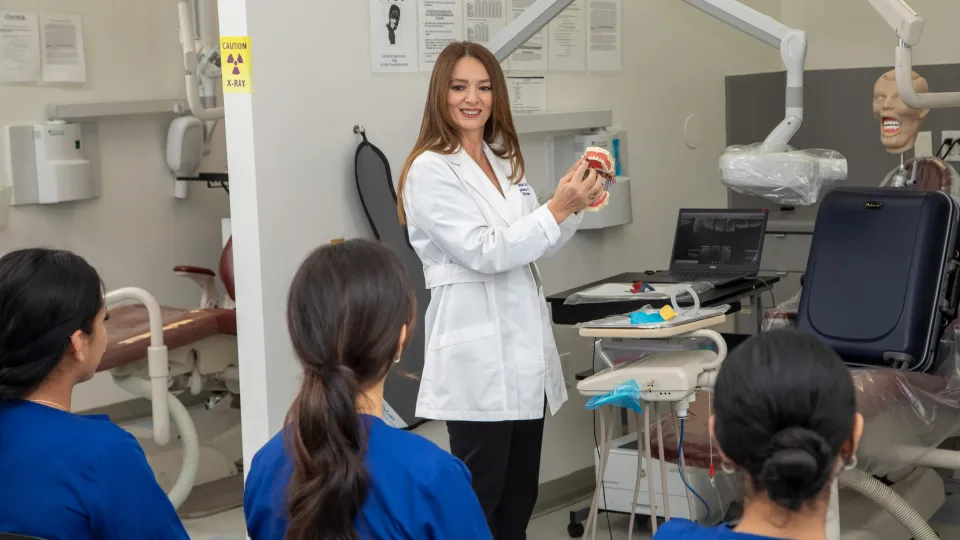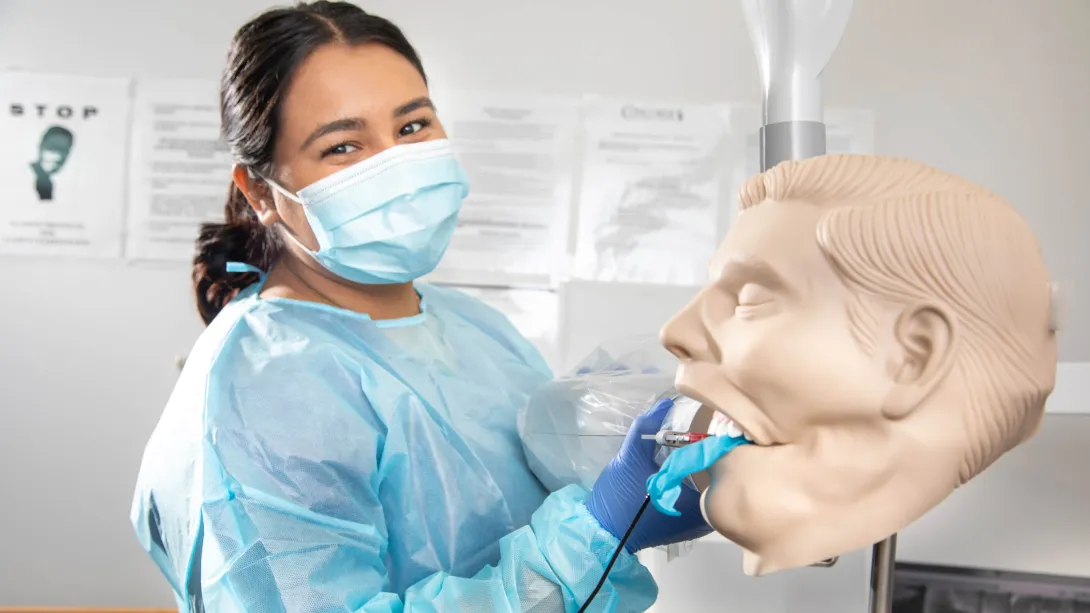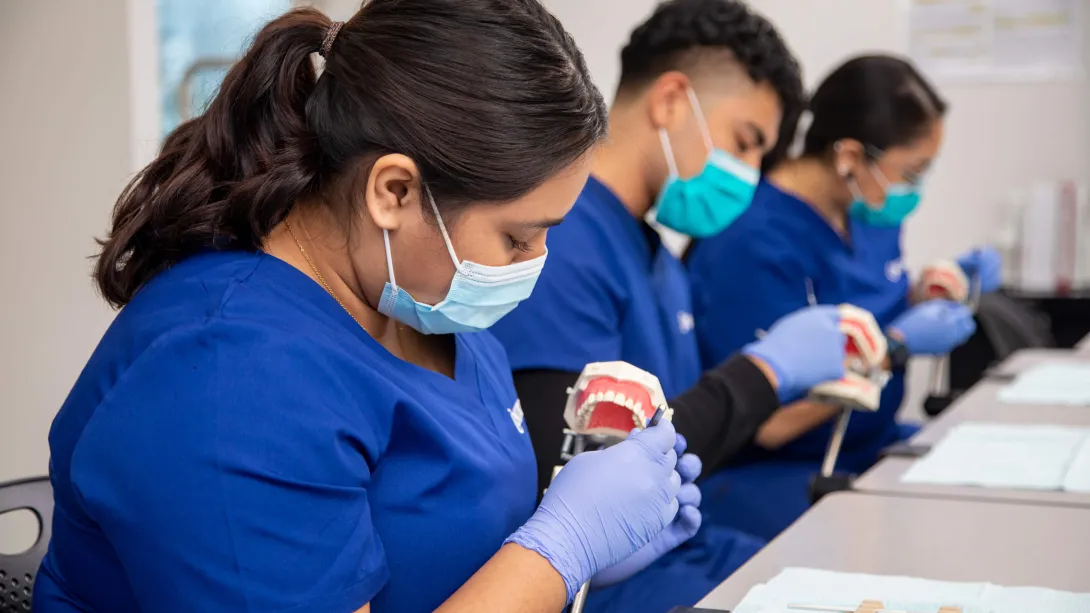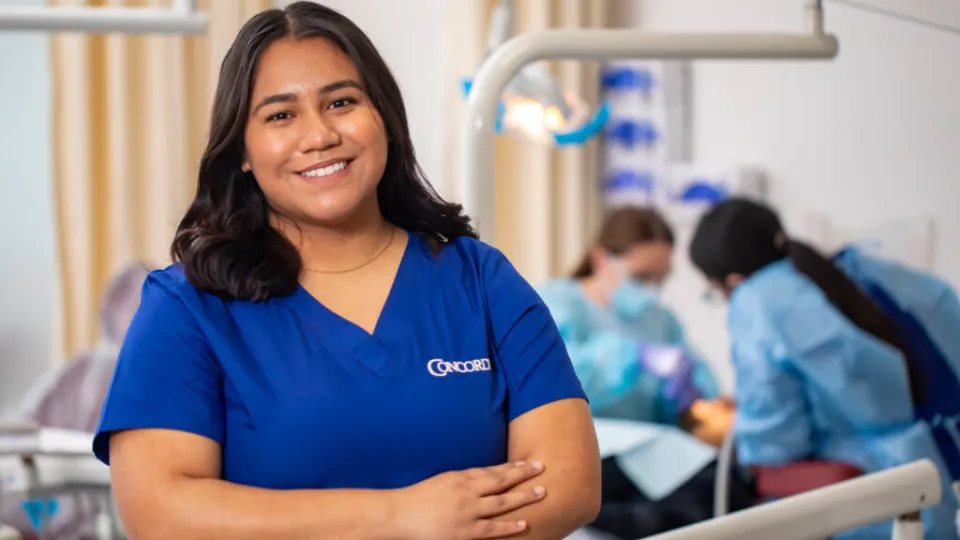
Your smile is often the first thing people notice about you, and there's a lot that goes into maintaining your pearly whites. A dental assistant helps people keep their smiles healthy, making it an appealing choice for those wanting to make a positive impact on their community and have a career in the dental field. With many avenues of specialization branching from this career choice, learning more about how to become a dental assistant can jump-start your education and get you on the right path.
What Does a Dental Assistant Do?
While duties may vary between dental practices, dental assistants support dentists through several administrative and dental tasks that all aim to deliver high-quality service to patients. The administrative responsibilities can include:
- Scheduling and confirming patient appointments.
- Issuing reminder notifications for patient appointments.
- Maintaining patient records and updating them as needed.
- Working with patients on billing and payment information.
Aside from administrative tasks, dental assistants also help with direct patient care. Some of these tasks may involve:
- Sterilizing dental tools and equipment.
- Preparing patients for treatments and procedures.
- Educating patients about proper oral hygiene.
- Handing dental instruments to dentists or surgeons during procedures.
- Processing dental X-rays.
- Completing laboratory tests under the guidance of a dentist.
Read more about a day in the life of a dental assistant.
Path to Becoming a Dental Assistant

There are many paths to pursue the training to become a qualified dental assistant. Some programs may offer a fast-track education path that can take less time than a formal degree program. Regardless of the path, each takes time and dedication to learn the skills and techniques of this career. Read on to discover more about the path to becoming a dental assistant.
1. Complete High School Education
There are many ways high school classes can support a future career in dental assistance. High grades can provide opportunities and additional financial benefits, but a high school education can also prepare students academically for a dental assistant program.
Classes such as anatomy, biology, and even foreign languages can all provide a foundation for pursuing this career in the future. Anatomy can teach about the human body and how each system works alongside the others, along with how dental health can affect the rest of the body. Biology is another class that can teach how the human body works and how certain processes work, such as X-rays. Language courses can foster communication with patients if they speak a different language.
2. Enroll in a Dental Assistant Program
Aspiring dental assistants can set themselves up for success by enrolling in a program that's focused on the techniques they may need at a dental office. The Dental Assistant program at Concorde consists of a focused curriculum that not only teaches techniques they may use as a dental assistant, but also elaborates on topics such as patient care, dental specialties, and orthodontics.
With the ability to complete this program in as little as eight months for the diploma program and 18 months for the associate degree program, students will have the opportunity to learn:
Dental Terminology

In the medical and dental field, there are many unique terms and concepts, so it's important to learn this terminology. It can improve a dental assistant's effectiveness by allowing them to translate what patients are discussing into specific dental terms, which can help diagnose and treat patient conditions. As for note-taking and record-keeping, understanding the terminology can also help speed up the process while maintaining a high level of accuracy.
Interested In How To Become a Dental Assistant?
Click here to explore Concorde Dental Assistant Programs near you!
Dental Specialties
There are many types of dental specialties, each with its own techniques and terminology. Learning about the specialties can help students pursue learning opportunities that can expand their knowledge. Some dental specialties include:
- Endodontist: This specialty focuses on diagnosing and treating conditions relating to the nerves of the teeth.
- Orthodontist: This specialty focuses on correcting malocclusion to promote the proper function of the teeth and jaw.
- Periodontist: The gums, or the soft tissues surrounding the teeth, are the focus of this specialty.
- Dental anesthesiologist: When it comes to pain management and patient health during dental-related surgeries or procedures, this specialty is the one to deliver.
- Oral and maxillofacial surgeon: This specialty involves the surgical treatment of diseases, defects, and injuries that affect the hard and soft tissues in the oral and maxillofacial region.
- Orofacial pain: Pain disorders of the jaw, mouth, face, head, and neck are the focus of this specialty, which involves diagnosing, managing, and treating these conditions.
- Dental public health: Prevention and control are the primary goals for many public health roles. Dental public health aims to promote awareness in the community through research and dental care programs.
Learn more about common dental assistant duties and work locations.
Patient Care and Management
Dental assistants are usually the point of contact between the patient and the dental care team. This involves promoting positive, safe, and comfortable patient care and managing their appointment. The Dental Assistant program teaches techniques for patient management and ways to handle different patient scenarios.
Dental Radiology
Radiology can help diagnose dental conditions and even help with preventive care. For example, taking dental X-rays for kids provides insight into how their teeth are growing and coming in and allows for advanced warning of potential issues or concerns. This can help parents and dentists plan to minimize those issues.
Orthodontics

Learn more about the steps dental assistants can take to get into orthodontics.
As mentioned before, orthodontics involves the diagnosis, prevention, and correction of teeth alignment. Bad teeth alignment can include an underbite, overbite, or teeth not coming together correctly because they are crooked. Correction involves teeth straightening that slowly moves the teeth and jaw to an optimal position to promote good teeth bite.
3. Pursue Certification
After completing a diploma program or associate degree, graduates can prepare to take the certification exam. As certification varies from state to state, it's important to research the state's specific requirements before going for the certification exam. Many states require dental assistants to also hold certification from the Dental Assisting National Board. Other requirements for certification may include:
- Completion of a fingerprint background check.
- Additional certifications for X-rays and nitrous oxide monitoring.
- Payment of certification fees.
4. Complete Hands-on Training
Completing hands-on training takes a step beyond book learning and applies the concepts and techniques in real time. This not only reinforces the concepts but also helps refine patient care techniques.
A useful way to gain this hands-on experience is through internship programs. They not only provide real-world experience in dental care but also may offer employment after program completion; some dental offices convert these internship placements into full-time roles.
Job Outlook for Dental Assistants
The United States Bureau of Labor Statistics projects a job growth of 7% between 2022 and 2032. This is faster than the average for all occupations and is attributed to the need to replace individuals exiting the workforce along with a continued demand for dental services. The BLS also attributes this growth to the aging baby boom population, which may have more oral health issues than younger generations.
Training to become a dental assistant can provide you with a rewarding career that improves the dental wellness of your community. If you're interested in pursuing a career in dental assisting, learn more about a Concorde Dental Assistant Program to see if it's the right fit for you and your future.
"What Dental Assistants Do," United States Bureau of Labor Statistics, https://www.bls.gov/ooh/healthcare/dental-assistants.htm#tab-2
"12 Types of Dental Specialties," White Oak Family Dental, https://websterdds.com/12-types-of-dental-specialties/
"State Dental Assisting Requirements," Dental Assisting National Board, https://www.danb.org/state-requirements
“Dental Assistants [Job Outlook],” United States Bureau of Labor Statistics, https://www.bls.gov/ooh/healthcare/dental-assistants.htm#tab-6
Take The Next Step Towards a Brighter Future
Interested in learning more about our Dental Assistant program?
We have a Concorde representative ready to talk about what matters most to you. Get answers about start dates, curriculum, financial aid, scholarships and more!







